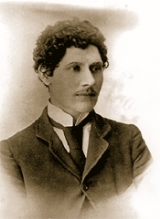
Richard Pearse
Overview
Richard William Pearse (3 December 1877 — 29 July 1953), son of Cornish immigrants from St Columb near Newquay, a New Zealand
farmer
and inventor who performed pioneering experiments in aviation
.
According to witness statements, Pearse flew and landed a powered heavier-than-air machine on 31 March 1903, some nine months before the Wright brothers
flew their aircraft. The documentary evidence to support such a claim remains open to interpretation
, and Pearse did not develop his aircraft to the same degree as the Wright brothers, who achieved sustained controlled flight
.
New Zealand
New Zealand is an island country in the south-western Pacific Ocean comprising two main landmasses and numerous smaller islands. The country is situated some east of Australia across the Tasman Sea, and roughly south of the Pacific island nations of New Caledonia, Fiji, and Tonga...
farmer
Farmer
A farmer is a person engaged in agriculture, who raises living organisms for food or raw materials, generally including livestock husbandry and growing crops, such as produce and grain...
and inventor who performed pioneering experiments in aviation
Aviation
Aviation is the design, development, production, operation, and use of aircraft, especially heavier-than-air aircraft. Aviation is derived from avis, the Latin word for bird.-History:...
.
According to witness statements, Pearse flew and landed a powered heavier-than-air machine on 31 March 1903, some nine months before the Wright brothers
Wright brothers
The Wright brothers, Orville and Wilbur , were two Americans credited with inventing and building the world's first successful airplane and making the first controlled, powered and sustained heavier-than-air human flight, on December 17, 1903...
flew their aircraft. The documentary evidence to support such a claim remains open to interpretation
First flying machine
There are conflicting views as to what was the first flying machine.Much of the debate surrounding records of early flying machines depends on the exact definition of what constitutes a "flying machine", "flight", and even "first"....
, and Pearse did not develop his aircraft to the same degree as the Wright brothers, who achieved sustained controlled flight
Flight
Flight is the process by which an object moves either through an atmosphere or beyond it by generating lift or propulsive thrust, or aerostatically using buoyancy, or by simple ballistic movement....
.

